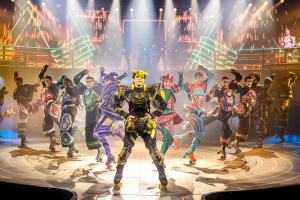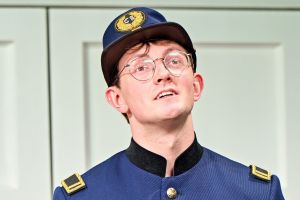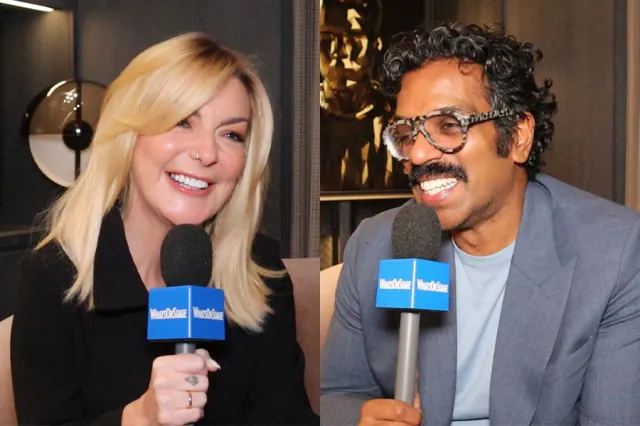Brief Encounter with … Composer Richard Beadle
Composer and musical director Richard Beadle recently released his debut album, Songs. Here, he talks to Whatsonstage.com about the inspiration behind his music and reveals a few of his favourite showtunes.
My father was a songwriter and the MGM musicals were essential viewing when I was growing up. My dad told me to listen to the lyrics of Lionel Bart in Oliver! and not to miss one syllable! I’d watch him marvel at the wordplay and melodies of Lerner & Loewe, especially My Fair Lady. He wrote a musical back in the 60’s which my brother and I, along with my dad adapted for a modern audience and put on with the local am-dram society when we were teenagers.
Everything fell into place, however, when I heard West Side Story for the first time. This seemed to be everything I’d always wanted from a music. Bernstein’s epic, exciting and awe-inspiring orchestral music fused with a young Sondheim’s lyrical genius together with my favourite story. I had learned Romeo and Juliet at school and adored it. This is how I thought all musical theatre should be. I have always believed that the music must reach the emotional heights of the story that you are telling. The story in itself is not enough. Otherwise, go and watch a play!
Which other composers and lyricists do you most admire? How have they influenced your own work?
As mentioned, it all began with Bernstein and Sondheim for me. After WSS, I discovered Sweeney Todd, which perhaps surpassed WSS as perfect storytelling through music. Sweeney’s descent into madness was perfectly captured by Sondheim using his unending ability to make the most beautiful melodies seem at the same time desperately haunting. More recently, I have admired the work of Jason Robert Brown who is perhaps my most obvious musical influence as he also gives a nod to the rock piano players I grew up trying to emulate, such as Billy Joel and Elton John. I have also learnt a great deal from his ability to run an emotional, lyrical structure through a song whilst hanging onto important structural rules of rhyming and meter
How does your approach to writing a musical theatre song differ from writing a pop song?
They are, and believe should always remain, two different musical structures. You are cheating a musical theatre audience by simply repeating a chorus, lyrically, for example whereas this is expected and indeed often required in pop music. A pop song may put across one simple emotion through a feel or a groove but a piece of theatrical writing must continue the narrative of the story where the script leaves off and the audience need to have learnt something they didn’t already know about the characters by the time the song has finished. More often than not, I write the lyrics first with a musical theatre song as this influences the melody and as mentioned before, it is the job of the melody and harmony to emotionally match the lyric.
What makes a great show tune?
As Sting said, if I knew the secret to writing a great song, I’d write one every day! I think a great show tune has the ability to express an emotion that cannot be put across with prose alone. Whether this is high comedy or the depths of despair, or simply a point number that doesn’t aim to further the plot, there must be a journey. There’s not enough space here to go into many of my favourites but they would certainly include:
“Pretty Women” (Sweeney Todd) – Sondheim’s ability to make create such a beautiful melody and observant, emotional lyrics whilst setting up an evil, murderous act of throat slitting is incredible!
“You’ve Got To Pick A Pocket Or Two” and “Reviewing the Situation” (Oliver!) – The most incredible rhymes and lyrical observations set to simple, memorable melodies by Bart, the ultimate wordsmith
“The Flesh Failures”/”Let The Sunshine” – In my own experience as an MD, very few things have matched the emotion of this final section from Hair, so often overlooked as a piece of musical theatre. Galt MacDermot’s melodies and grooves were so enjoyable to play and you could hear a pin drop in the audience every night as the a cappella strains of “Let The Sunshine” drifted through the auditorium
“Tonight” Quintet (West Side Story) – Now here’s how you end Act 1! The culmination of Bernstein’s melodies (all born from one musical interval, the flattened fifth), it is the beginning and the end of how to structure the coming together of different visual, narrative and musical ideas in an incredible, explosive finish.
Who are the most exciting musical performers to write material for?
Borrowing from my knowledge as a musical director, and having learnt from some of the best musical supervisors, directors and choreographers in the business, the voice and the look is nothing without the acting! Many people can get through “Defying Gravity”, for example, but putting across the required emotion is a different story. For that reason, I love write for people who have their own individual, unshakeable understanding of the overall content of the music as well as distinctive vocal personalities.
People such as Hannah Waddingham, Louise Dearman and Julie Atherton all have these qualities. They bring out all that I had conceived in the writing process as well as their own gems that would never have crossed my mind. As theatre is a collaborative process, this is essential in great performers. I would love to write for Norbert Leo Butz, Gavin Greel and Caissie Levy and others for the same reason. They create a unique stamp to whatever they sing
When will see the first full Richard Beadle musical produced?
As is always the case, it is only time that prevents any project from coming to completion. Today Is My Day, which I presented in a workshop in 2010 has gone back to the drawing board and will hopefully be finished by the end of the year and I have an epic idea based on an classic novel that I would like to begin tackling early next year. I think I already have another album’s worth of individual musical theatre songs which I would like to put together as well as an idea for a song cycle that is also about 30% complete. I also write pop/rock songs which keeps me busy and I will be musical director of The Bodyguard later this year, which I am very excited about.
How do you rate the state of musical theatre in the UK?
I think musical theatre is very healthy and to misquote Twain, the rumours of its demise are greatly exaggerated. I think the populist musicals can and should continue to co-exist alongside the more obvious high art pieces and I think it has always been the case, certainly more than we often care to admit. Having had the honour to work with Stiles & Drewe on Betty Blue Eyes, I believe that there is still an ability to produce incredibly original stories and music and there are, of course, many young composers coming through the ranks having learnt their skills from the greats. Equally importantly and often overlooked, there are young producers and directors willing to take risks with new projects to put before a still hungry public! I hope, in some small way, that I may be a part of that process.
Songs is on general sale now. Visit www.richardbeadle.com for more info.












